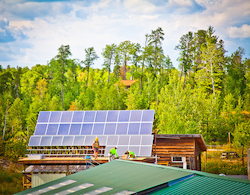Will Steger, a globally renowned climate expert, has announced a major milestone toward the completion of the Will Steger Wilderness Center, that will be used as a leadership retreat center. The facility now features a stand-alone, carbon free power system that will provide electricity to buildings and workshops throughout the site located outside of Ely, Minnesota near the protected Boundary Waters Canoe Area Wilderness (BWCAW). The renewable power system is an extension of the Center’s focus on clean energy and the use of renewable materials and sustainable processes throughout its operation.
The island-mode power grid will also serve as a demonstration project intended to be a model for other off-grid power systems in remote locations. With the completion of Phase I of this power grid, the system is now capable of providing up to 20 kilowatts of power from a combination of solar and battery sources with solar providing more than half of the energy. The system includes automated demand management capability to provide power for mission-critical functions along with a backup diesel genset for emergencies. It is designed to provide power for multiple buildings on the site and power for the construction finalization of the main retreat center building. The first pilot leadership team is expected to use the center by the fall of 2016.
A launch event will take place October 7, 2015 at the Will Steger Wilderness Center and will include a ceremonial flip of the switch to ‘power-on’ the system by key participants who have provided both technical and material resources. Cummins Power Generation provided the genset and helped in the technical design and feasibility study in the early stages of the project. Other partners include Jon Kramer, CEO of Sundial Solar; Dr. Greg Mowry, associate professor in the School of Engineering at the University of St. Thomas; tenKsolar; and BAE Batteries. Participants in the demonstration project have donated the vast majority of the material and labor for the system.
“This is an exciting time for all those who have worked to demonstrate that it is possible to have a community working with modern technology in a remote wilderness area using only self-contained and renewable energy sources,” said Will Steger, executive director of the Will Steger Wilderness Center. “The completion of the power grid is also a leap forward toward our goal of bringing leaders to a fully functioning wilderness retreat center to work on complex issues such as climate change and sustainability. We’re grateful to all of the contributors to this project who are demonstrating that it is possible to live and work on real-world problems using sustainable practices that will not deplete scarce resources.”
In addition to its future purpose as a leadership retreat center, the Will Steger Wilderness Center has been the base for more than a dozen significant expeditions including the 3,471 mile International Trans-Antarctic expedition, the first unsupported dogsled expedition to the North Pole and many other expeditions that have brought back some of the earliest eyewitness accounts of climate change in remote arctic regions.


